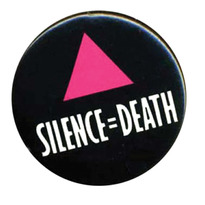This week’s controversy about Hillary’s claim that Nancy Reagan was a meaningful advocate and change-maker for AIDS policy in the 80’s brought back memories of hush-hush AIDS days in the 80’s and exploding AIDS activism in the late 80’s and early 90’s. Ron and Nancy Reagan had much more to do with the hushing, and nothing to do with latter-day advocacy other than inciting anger and inspiring protest. As for Hillary and Bill? I recall sitting at a chi-chi AMFAR dinner in NYC in the early 2000’s and witnessing actor and activist Richard Gere chastising Bill Clinton loudly and clearly for doing NOTHING to help the AIDS cause when he was President. Bill and Hillary sat at their table with frozen smiles on their faces. There was a moment of distinct discomfort. The moment passed, and the meal and (friendlier) celebrity speeches continued.

Despite a non-existent presidential policy in the (Bill) Clinton years, activist organizations like ACT-UP waged a battle to fast-track to market any drug that might lessen AIDS sufferers’ agony and possibly offer a cure. They scored some victories. In 1997, with Congress’ approval, the FDA initiated a program to bring promising drugs to market, allowing positive lab results to take the place of clinical trials. In the ensuing years, this has become a double-edged sword for the public-at-large. The flip side of AIDS victories are psychotropic drug nightmares.

What if we could go back in time? Perhaps if benzodiazepines had been studied thoroughly in the late 50’s for long-term efficacy and effects, they might never have been approved for market. Perhaps. At any rate, I would have liked to think that lessons were learned, and that in more recent years the FDA would not have allowed such short-sighted test-and-release practices for drugs that target and alter our brain chemistry. Unfortunately, it appears that the loosening of FDA standards has made things worse. As a matter of fact, between 2008 and 2015, sixteen new psychiatric drugs were fast-tracked to market.

Last week, I interviewed Danish scientist Peter Gotzsche for the film. Gotzsche has been a tireless advocate for pharmaceutical industry transparency and properly-run clinical trials that do, indeed, demand study of the long-term effects of a drug before it is introduced to the market. But the FDA does not appear to be listening. It is far too easy for drug-makers to focus on short-term effects. Long-term effects and injury, be damned, as those with benzodiazepine damage know only too well. On the global scene, there are now millions of people who have been “adversely affected,” i.e., injured, even destroyed, by benzodiazepines and other psychotropic drugs. A lax FDA and an avaricious Big Pharma, holding themselves up as the arbiters of correct drug fact and education, lead doctors and practitioners to ignore better-researched evidence, to look the other way, and to continue to write misbegotten prescriptions for benzodiazepines.
It’s going to be an interesting year. Who has the guts to take on Big Pharma? Bernie has been outspoken about price-gouging, but not about pharmaceutical injury. Oh, what we can teach him! I am certain that he would make a willing student. No way do I think that there is any other candidate who is free and clear from Big Pharma ($$$) influence. Sorry Hill, revisionist history will not change your record of support from Wall Street (Big Pharma’s best friend). Scary to think I’ll have to vote for Hillary if Bernie does not get the Democratic nod at the July convention. But I’ll do it. Of course, I’ll do it. The Republican alternative is just too frightening to consider.
One way or the other, let’s prepare to enlighten and educate our new president. All hail a benzo-wise Commander-in-Chief!
